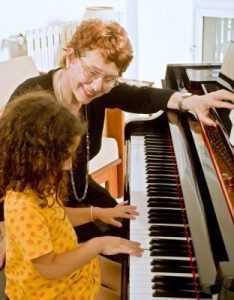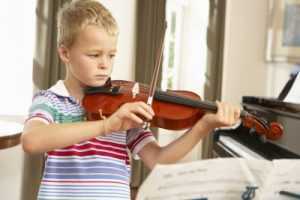Imagine this scenario: you’re the parent of a curious five-year-old child (we’ll name the child “Julie”) who can sing her favorite song on the radio in key by memory. After recognizing Julie’s growing love for music, you buy her a keyboard to play that she loves to bang around on for what seems like hours every day, creating new and wonderful songs for all to enjoy. Her enthusiasm for music by this point seems unquenchable. Finally, the thought manifests in your mind—Julie may be exhibiting some musical talent. Maybe it’s time to sign her up for some music lessons for kids.

Few situations are more fulfilling for a music teacher than recognizing the origins of a lifelong passion for music developing in a student. However, passion and enthusiasm are often difficult to distinguish, particularly in young children. Many teachers choose to opt out of having a fixed age requirement for their studio and will accept nearly any young student who is willing and eager, largely due to the fact that it’s incredibly difficult to gauge whether a young student is ready to begin lessons based on age alone. Enthusiasm for music can certainly develop into passion that will provide all the motivation and perseverance required to learn an instrument; however, it’s essential to ask yourself the following questions as the parent or guardian regarding your child before enrolling them in music lessons for kids:
Is my child able to sit and focus for a 30+ minute lesson?
Most music lessons for kids, especially very young ones, will last for 30 minutes, though some teachers prefer longer sessions (sometimes up to an hour). Even 30 minutes can be extremely difficult for a young child to sit through attentively. However, if you’re worried that your child might not be able to sit and focus through an entire lesson, that doesn’t necessarily mean that lessons won’t be successful. I would recommend asking your potential teacher(s) the following questions to accurately assess how your child might do in his or her music lessons for kids and to help establish expectations:
How do you organize your lesson time? Are multiple activities involved to help break up the lesson, or is the focus based on one topic for the full duration? 
This question is not only important for preparing your child for what to expect in his or her first lesson but also for helping evaluate the level of flexibility allowed in lessons. Some young students thrive off of stricter, more focused lessons while others succeed at lessons that bounce from activity to activity every few minutes. Some teachers are willing to adjust to each student’s particular needs, and some teachers stick with a set teaching style. There’s no correct answer for what method ultimately works best, but it’s worth both your time and your teacher’s time to investigate this relationship before lessons begin.
Does my child travel to your teaching studio for lessons, or do you travel to my home?
More often than not, teachers and students consider location a non-issue. That being said, if you know that your child will have a much more difficult time focusing at home rather than in a teaching studio (or vice versa), then it’s worth considering the location for music lessons for kids. The travel time to the teaching location will also factor into whether your child has enough time to devote to music lessons, which I’ll elaborate on later in this article.
 Do you currently have other students around the same age as my child?
Do you currently have other students around the same age as my child?
The teacher’s comfort level with teaching young children impacts your own child’s comfort level. Though it’s not necessary for the potential teacher to specialize in teaching young children, a teacher who currently teaches students your child’s age could open the possibility of doing group lessons with other children (usually at a lower cost for you and sometimes more stimulating for young children than individual lessons).
How well can my child read?
While communication between student and teacher in music lessons is primarily verbal, teachers will almost always write down assignments for practice time. Additionally, lesson books contain instructions that need to be reviewed while the student practices, and the basics of learning any instrument (music theory) require an understanding of the alphabet. The ability or inability to read won’t impact the success of the music lessons for kids itself, but will inhibit any progress the student might make if he or she is unable to practice and understand assignments. If the parent is willing to sit down with the student to help communicate written assignments and directions during practice time until the student is able to read proficiently, however, then the student’s reading ability won’t cause too much of a disadvantage.
Does my child realistically have the time to commit to learning an instrument?
Take a moment to consider the hours spent in school each weekday, time spent completing homework and participating in other activities (such as sports, dance, religion class, etc.), time spent at day care or play dates, and time needed for everyday needs (meals, baths, downtime). Once you have an idea of what your child’s daily schedule looks like, factor in not only the 30+ minutes needed each week for the music lesson but also the time spent commuting if traveling to the teacher and a few minutes each day to devote to practicing. Equally important, do YOU as the parent or family member have the time to help your child with his or her practice if needed?
My personal teaching philosophy with young students (based on what I’ve found most successful over the past few years) is consistency over duration—practicing for 10 minutes a day will be much more beneficial than practicing for an hour once a week. If it doesn’t seem feasible for your child to spend 10 or so minutes a day while still enjoying the process of learning an instrument and not feeling overwhelmed, then now may not be the time to enroll in music lessons for kids.

My goal in writing this article is for anyone debating whether his or her young child is too young for music lessons can make this difficult decision with confidence. Your child’s age is only one of many factors to consider, and approaching lessons with some contemplation beforehand will undoubtedly result in a more successful and rewarding experience.







I really like that you talk about how each child will be different in terms of how long they can focus and how well they read. I want my son to take music lessons but I’m not sure if he’s ready yet. He still has trouble sitting down and doing one task for a long time and while I’m sure he couldn’t handle a 30 min lesson, making sure he’s ready is important to me so he learns to enjoy it rather than dread it.